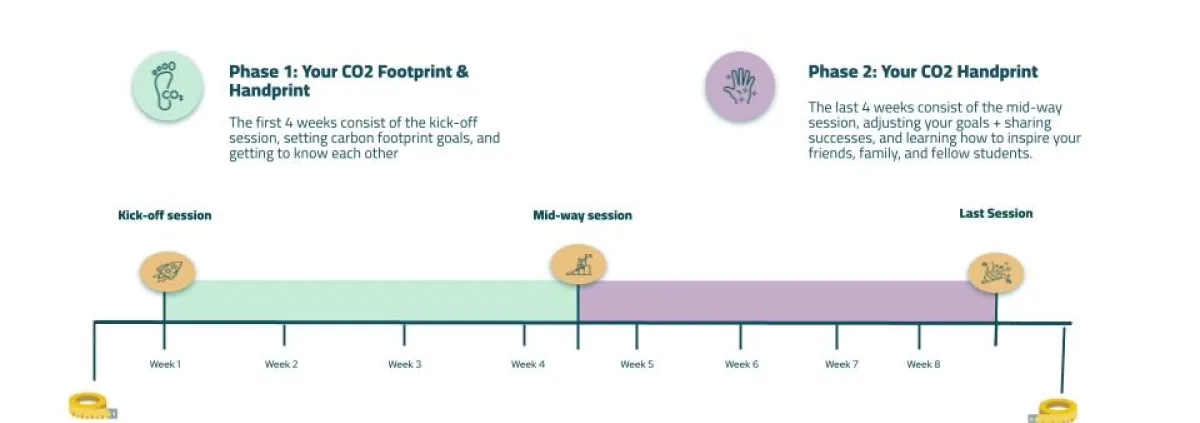About
SHIFT is a community for youth engaging in climate action. It aims to help young people live the green lives they want through a trustful community, curated inspiration and knowledge and a focus on data-driven mitigation actions.
Shift address challenges related to well-being among young people, such as feeling isolated, overwhelmed and lacking proper influence to exercise the fundamental right to a safe life.
The community is built around an 8-week programme of workshops, curated sessions with knowledgeable experts and inspiring front runners, who help equip participants to both change their own habits and manifest their thoughts and actions as competent, robust ambassadors of climate action.
Running in two parallel tracks, a fully virtual programme and a programme with physical anchoring in a youth culture house in Herning, a mid-sized city in Jutland - essentially exploring hybrid ways of building bonds across geographical boundaries.

Subjects covered
-Climate footprints, including tangible mitigation actions related to food, mobility, energy and clothing & gadgets.
-Climate handprints, including climate psychology and constructive climate conversations, how to positively inspire friends and family, building support for tangible mitigation actions at studies/workplace.
-Building and maintaining long-term habits
- Supporting peers in changes

Pedagogy
Learners engage in a cycle of understanding, acting and reflecting, that allows them to understand the signifance of a variety of mitigation actions from not only climate but also perspectives like health and cost, trial these mitigation actions in their own life while sparring with their peers and reflect on their potential to inspire their surroundings. Results of actions are measured by the learners using our carbon footprint calculators. In this sense, it's a experiential learning process situated in a community-oriented and collaborative setting.

Impact
"I'm now planning my holidays using international rail. A few years ago I would have just bought flight tickets without thinking twice"
“Fourth week in a row for me as a vegetarian! Nothing too advanced, just plenty of lentils, beans and vegetables. Feeling great so far, and even my exercising and training is going super well!"
- Two former participants.
Four in five participants maintained their mitigation actions 3 months after the program. Commonly, one to two new actions were taken by each participant with an average improvement of climate footprint of 0.5 to 2.5 tonnes pr. year. Many participants spread the word to their peers, on average reaching five peers pr. participant. Common reactions include deeper insight and increased motivation for mitigation actions.

Innovation areas
Shift aims to build green competences and change behaviours. The programme is designed to provide the time, space and community to grasp the opportunities for change that face each of us everyday. Young people can be influenced by marketing, lobbying or even misinformation on climate impacts of their choices. On your own, impact of behaviour change can feel distant. Shift takes the real life situations that truly matter and deciphers the climate friendly response and scales them to a larger group that encourages themselves and each other. With both a "before and after"-calculation, learners get direct access to scientific data outlining the proportion of their positive impact. Importantly, the climate handprint builds the skills to advocate for green action in social and organisational settings.

Who is involved
A variety of non-traditional learning actors are involved in the initiative, including:
Young subject matter experts (e.g. sustainable food, mobility, energy and clothing & gadgets), who give sessions to help learners address concerns and wishes arising from lifestyle change.
Young frontrunners, who give sessions to help learners envision success, find role models and build motivation.
Learners join freely, based on free will, to partake in the program and larger community.
The youth culture house host and promote the local program. The local sustainability hub (initiated by city government) manages and co-facilitates the program. Facilitation experts design and lead the facilitation.



Really glad to support realising this transnational transfer of a climate-focused education program inspired by experiences gained in the Netherlands!
Very interesting with this Shift-progam!
This sounds like a terrific project! Can't wait to hear more about it.
Please log in or sign up to comment.